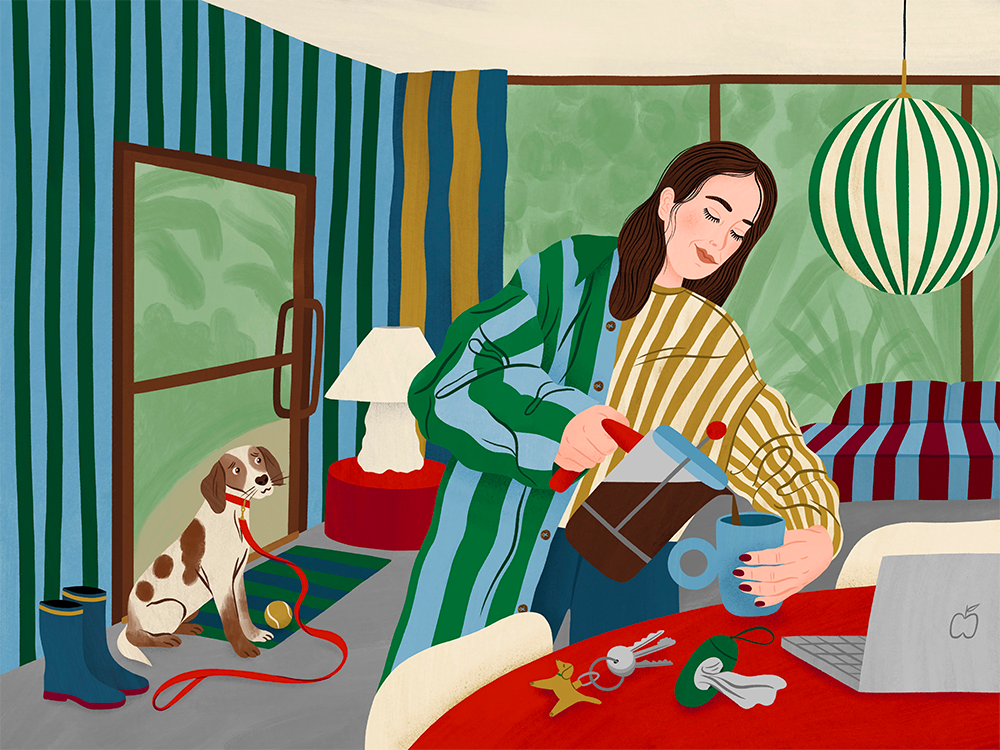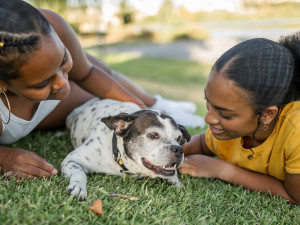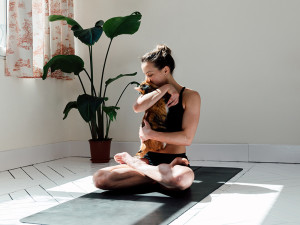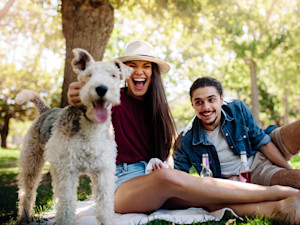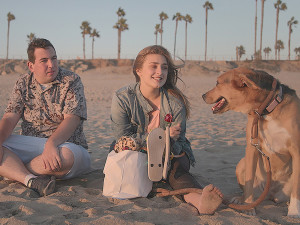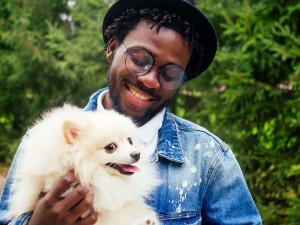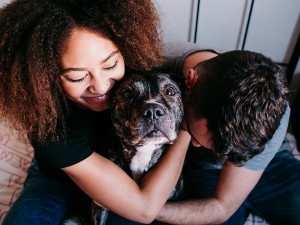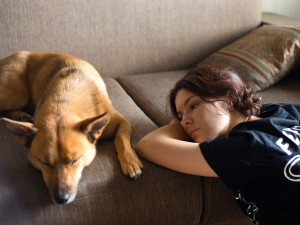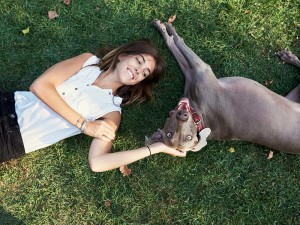I Have ADHD—Does That Make Me a Bad Dog Mom?
My brain isn’t always reliable, and I wonder if my pups hate me for it.
We were going for a walk. The harness and leash were on the dog, the fanny pack, full of good-girl treats was hanging on the hook. Our herding dog, Georgie, was at the door. I had my jacket on. Then, suddenly, I remembered the laundry needed to be switched in the basement.
This kicked off a series of distractions, and 30 minutes later, Georgie was still standing at the door, not being paid much attention to her. I’d completely forgotten about the task we’d started — simply going for a walk — and clearly had no intentions of following through. Finally, as I continued to putter around the kitchen, Georgie barked. She walked over to me and put her paw on my foot, as if to say, “No. More. We. Are. Going. For. A. Walk.” Finally, we went for a walk.
That day, about two years ago, was when I understood Georgie’s probably the only neurotypical being in my home (as true as that can be for a dog). And that was also the day I began feeling immense guilt for how my attention-deficit/hyperactivity disorder (ADHD) affects the pets in my life.
ADHD: my lifelong nemesis
I was diagnosed with ADHD when I was four years old. I have what’s called “inattentive ADHDopens in new tab,” which means I get distracted by what’s going on inside my head. I wasn’t the “hyperactive” kid disrupting class with spitballs or interrupting the teacher mid-lesson. I was the daydreamer.
How much do you spend on your pet per year?
And, though I’m sure the adults in my life had the best of intentions, the message they sent me was not to let anyone in public know that I struggled. At school, I waited until the other kids were busy to slink off to my resource teacher’s room, where I got extra time on math tests. I also put every ounce of energy I had into masking,opens in new tab or trying to fit in with the “normal” kids. At home, I was called a “space cadet” or a “spaz” (emotional regulation opens in new tab was hard, and I often had outbursts around my family). I was punished for leaving tasks unfinished. This only increased my anxiety, which told me stories about how much of a failure I was on a daily basis.
Jessica McCabeopens in new tab, known for her YouTube channel, How To ADHD, opens in new tab and author of How to ADHD: An Insider’s Guide to Working with Your Brain (Not Against It)opens in new tab, tells me this kind of shame is very common for someone with a brain like mine. She says that what I’m describing is called “internalized ableism.” In the context of that walk with Georgie, this means I’m chastising myself for not being able to complete a task in the moment.
McCabe adds that “it doesn’t typically help with managing your symptoms to be so hard on yourself. In fact, the guilt of ‘dropping the ball’ can lead to a shame spiral — ‘I’m the worst!’ — or add anxiety and/or depression to the pile of struggle, which can make it even harder to cope.”
My ADHD can be a superpower at work. I’m able to hyperfocus and meet deadlines, opens in new tab aided by the use of alarms and calendar reminders. But as a parent to two dogs (we’ve added a deaf dog named Charlie to our family in the past year), my ADHD rears its ugly head constantly.
Nearly every morning, I’ll go down to the kitchen to feed them breakfast and start unloading the dishwasher or cleaning the countertops instead. It’s gotten to the point where Georgie will wait at the top of the stairs until she eventually hears me take the lid off the food bin. Then, once she can trust that the thing she wants to happen is happening, she’ll descend. Charlie just waits at his bowl, blinking at me hopefully.
Saying goodbye to the perfectionist
So, do they hate me for how I am? Does Georgie resent me for having to take care of me when I lose my way doing everyday chores? Karen London, a behaviorist and regular contributor to this siteopens in new tab, assured me this isn’t true.
“I think dogs are used to the life they’re living,” she says. “A lot of dogs sort of take it as it goes … I think whatever systems you could put into place for yourself that make it less likely for [care tasks for your dogs] to slip through the cracks, the better, but I certainly wouldn’t want anyone with ADHD or anyone else to beat themselves up about not having exactly everything go according to plan. Life’s just not like that.”
Here, London touches on another common issue, especially for girls and womenopens in new tab with ADHD (and folks raised and socialized as girls): We are perfectionists. We hate messing up, and we hold impossible standards for ourselves.
Often, girls with neurodivergence are not given the support they need. This memeopens in new tab, showing a swimming teacher helping a boy and ignoring the girl, really drives that home. We suffer alone and want to present a perfect image to the world. And if we don’t, it feels like the world is falling apart, aka something called rejection sensitivity dysphoriaopens in new tab.
When this kind of spiral happens to me, McCabe suggests taking the “two coaches” opens in new tab approach. So, maybe I promised my pups an enrichment sessionopens in new tab with their snuffle mat and completely blanked on doing that before leaving to go out for the night. When the critical voice in my head, Coach A, tells me I’m the worst dog mom in the world, Coach B, the kind voice, can swoop in and say something like, “You’re doing your best today, and your dogs know that.” The conversation continues until Coach A has chilled out.
Implementing easy changes
McCabe, a dog parent and new parent to a tiny human, says she’s had to “learn that being a ‘good enough’ parent isn’t only ‘good enough’ — it’s ideal!” So, simply using that positive self-talk is a great start. And so is fitting in some easy coping mechanisms.
A big thing I feel guilty about is forgetting to do daily training with my dogs to fine-tune things they need to work on. London suggests implementing that training into our daily routine. So, if we were working on a “sit” and “stay” with Charlie, for example, I might take him into the bathroom with me while I brush my teeth and have him do a “stay” for the duration.
She also suggests doing this work at the time of day when my brain functions best. For me, that’s the morning. Post-work day, forget it. I’ve got exactly two brain cells still standing at attention, and their respective jobs are to feed me and put me to bed.
McCabe says that something called “body doublingopens in new tab,” or having a buddy do a task with you, is a great tool. “Body doubling while caring for a pet could mean finding a walking buddy; it could also mean calling/texting a friend, letting them know you need to take your dog for a walk, and asking if they can keep you company over the phone while you do.”
When it comes to “time blindnessopens in new tab,” another common ADHD struggle illustrated in my earlier pre-walk story, she says to use a “tracking method.” This can be something like a schedule on the wall that you mark off at each feeding so you know the last time your dog ate. That way, you have a reliable system that you can lean on.
Remembering your brain is a good brain
The bottom line: This is the way my brain is. She pulled a Lady Gaga and was born this way. It doesn’t make me inherently bad. It doesn’t make me less valuable or capable than anyone else. And my dogs absolutely do not judge me for it. I mean, one of them suckles on the couch cushion like it’s his mom, and the other one methodically dismembers her toys with the slightly sinister intensity of a surgeon in a horror movie. They’ve got their own issues.
Jokes aside, if you’re struggling to accept your ADHD, too, keep this final thought from London in mind: “The people who are hard on themselves about [how they care for their] dogs are often the ones who have set the bar for perfection and are doing a fantastic job.”
So, if that’s you, please take the win. You deserve it.
